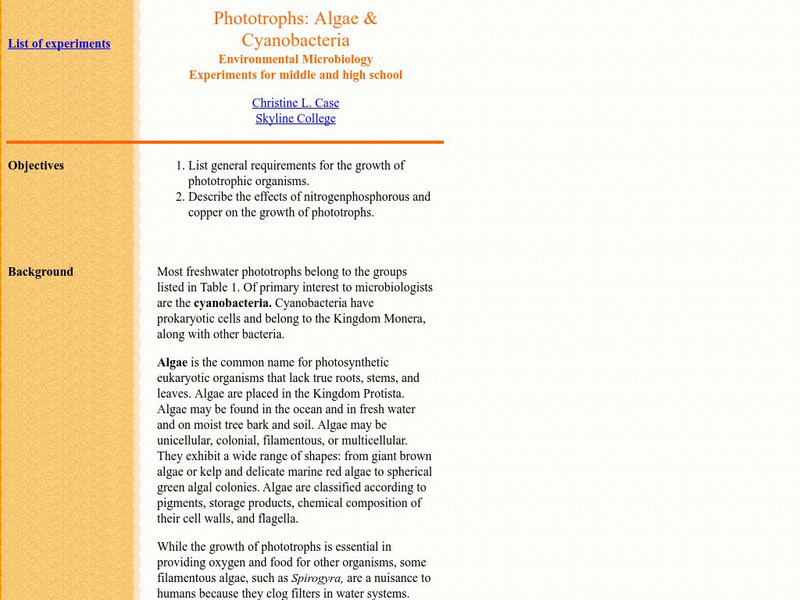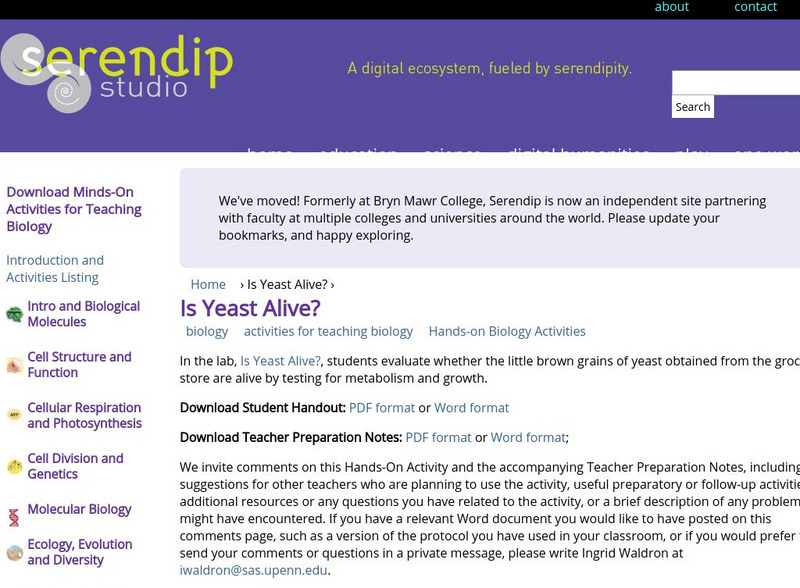Curated OER
Human Evolution: Biology, Bones
Learners will love a weeks worth of bone study. They use bones and characteristics of bones to explore the evolution of hominoids. Bones are compared, categorized, and considered. A great way to bring physical anthropology and material...
NASA
Nasa: Building a Winogradsky Column [Pdf]
NASA teacher's guide to building a Winogradsky Column to study microorganisms. When this guide was first released, students were invited to participate in two webcasts with NASA scientists. The conversations from those webcasts are...
PBS
Zoom: Kitchen Chemistry
Did you know that chemistry can be found in your kitchen? Enter this amazing virtual world where your first stop is to the kitchen. Locate the clues and move on to the Lab Journal where you can test each item in two experiments: Cabbage...
PBS
Pbs Learning Media: A Colorful Hypothesis
Use "Dinosaur Train" to illustrate and excite your students about creating a hypothesis. Website includes a video of "Dinosaur Train", a lesson plan, and student's handout. Lesson plan includes a lab where students can practice making...
University of Illinois
University of Illinois Urbana Champaign: Chickscope: The Journey Begins
Journey with the chicken egg, from formation to hatching, and learn about its embryology.
Other
Skyline College: Phototrophs: Algae and Cyanobacteria
A lab activity where pond water samples are collected to observe the requirements for the growth of phototrophic organisms. To observe these requirements samples are separated into different variable groups. One group is incubated in the...
Other
Kid Wind Project: Teacher Resources
A collection of inquiry-based and hands-on activities to introduce students to wind energy. Includes PowerPoints, labs, and videos.
Museum of Science
Museum of Science and Industry Chicago: Online Science: Drop Eggs Into Cups
Step-by-step illustrated instructions showing how to drop four eggs into four cups without touching them. Demonstrates the concept of inertia according to Newton's first law of motion.
Physics Classroom
The Physics Classroom: Inertia and Mass
This is part of a lesson on Newton's Laws of Motion that focuses on inertia and mass. It restates Newton's first law of motion. The lesson also gives a helpful visual description concerning friction.
PBS
Pbs Kids: Conduction Countdown
PBS offers an experiment that kids can do at home to learn more about heat conduction and how it works.
PBS
Pbs Kids: Dragonfly Tv Do It: Grow a Crystal
This PBS Kids site teaches students about crystals and includes an activity that shows how to make sparkling gems at home.
PBS
Pbs Kids: Dragonfly Tv Do It: Leaf Me Alone!
How do leaves breathe? PBS site explores how plants breathe and sustain life.
PBS
Pbs Kids: Dragonfly Tv: Know How? Cutting a Rock
How can you cut a rock without a saw? Is it possible? PBS site invites you to come along with Mike and Victor to find out.
Bryn Mawr College
Serendip: Is Yeast Alive?
Brief text summary of what students learn in the Is Yeast Alive? Lab, along with links to download Student Handouts and Teacher Preparation Notes in PDF or Word formats. Characteristics of life are addressed and metabolism and the...
Bryn Mawr College
Serendip: Diffusion Across a Selectively Permeable Membrane
Brief text summary of what students learn in the Diffusion across a Selectively Permeable Membrane lab, along with links to download Student Handouts and Teacher Preparation Notes in PDF or Word formats. Main teaching points include...
My Science Site
Neuroscience for Kids: Types of Neurons (Nerve Cells) [Pdf]
Site delves into what neurons are and what they do. Also contains colorful illustrations of neurons.
My Science Site
Bj's Science: Microscope Diagram [Pdf]
Site is simply a picture of a microscope that has numbers that correspond with each part of it. No answers are provided. A good reproducible if you are looking for a detailed view of the different microscope parts.



![Nasa: Building a Winogradsky Column [Pdf] Activity Nasa: Building a Winogradsky Column [Pdf] Activity](https://static.lp.lexp.cloud/images/attachment_defaults/resource/large/FPO-knovation.png)









